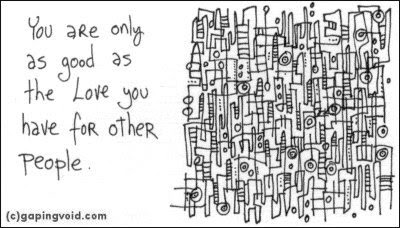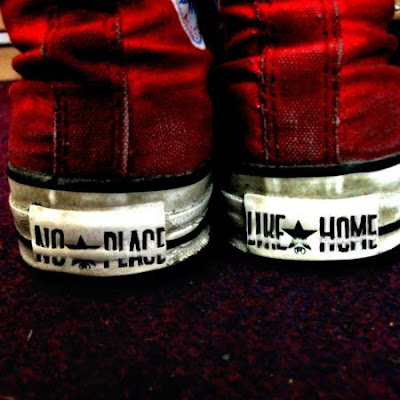Philanthropic Faith

I recently had a discussion with a friend regarding faith - religious and otherwise. This topic was specifically inspired by her noting how much I invest in other people, while being unable to devote myself to a religious view.
She asked some seriously great questions for me to ponder and eventually answer. This was a killer opportunity to learn from her ideas as she is strongly of the Christian faith, while establishing and organizing my own thoughts and beliefs. Thus I feel it appropriate to share, per her permission, with you.
"People are self-centered by nature," she explained. "I don't put any faith in them. Being hopeful that they will respond to my love in kind is important, but it's about having the right expectations so that I'm not caught off guard by disappointment."
This is something I intensely disagree with.
While she loves and feels the need to help people, my friend finds all strength, recognition, comfort and encouragement that she needs in God. For this I fully respect her. Yet in opposition to her view, I feel that humanity may very well be the only thing in this world that may not leave me disappointed.
I am a fiercely faithful person. Sometimes, often, to a fault. I trust easily and want badly to see the best in people. I am fully aware that people are not perfect; we possess light and dark sides to us, pure parts and parts marred by our own mistakes the mistakes of other people. The power to both hurt and to heal is within our grasp, and I am faithful that people will in the long run make their way towards good by accepting all parts as a whole.
Again unlike my religious conversational counterpart, I feel that this life may be the only one we have. Who am I to say I am right, but even in the era of my life when I did channel my faith toward religion I had no concept of Heaven or Hell; the idea of an afterlife just was not something I wrapped my mind around. Either way, I feel like we have the capacity to make this life incredibly enjoyable. Perhaps not heavenly, but I am convinced that an honest, gritty, earned sense of happiness is achievable right here, right now.
My bubble does get burst on occasion. Yet no matter how hard I get hit, no matter how badly it hurts to be disappointed or to see a someone I love not reach their potential as a person, I have an ever-full reserve of faith, hope, and love for them.
Trust me when I say, this sets me up to inevitably take my tumbles. It is only human to hurt when you are let down, but it's what you do with those sentiments that shapes how you see people and how you effect them in return. It is so easy to allow those negative feelings to trap you once you've fallen. In an attempt to avoid that, I make conscious efforts to see these instances as a chance to forgive and learn (as opposed to forget) and send a person on through life with a clean slate, as a chance to do better later.
My idea is not about blocking out the bad, solely remembering the good and blindly hoping for better. It is about seeing what good an individual is capable of and having faith that they will live up to that. I feel that my mindset gives the people I come into contact with throughout my life the solid chance to be wonderful. I hope I am given that chance as well.


Comments
PS - interesting to see how your faith in humanity goes after A Clockwork Orange.
And to that hard-earned gritty sense of happiness you find in the accomplishments of life, I suggest, of all things, a Bible chapter. Ecclesiastes is written by 'teacher' and throughout its meandering, rambling way teaches us that although life is fleeting and God will love us in the toil, it is within our day's work where we find happiness, be the days good or bad, for our hope and joys reside solely within our ability to take the time we have and enjoy it.